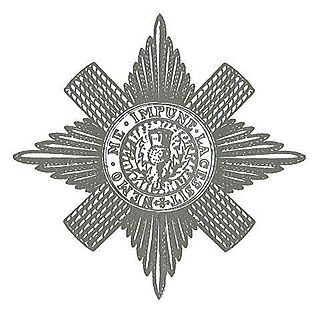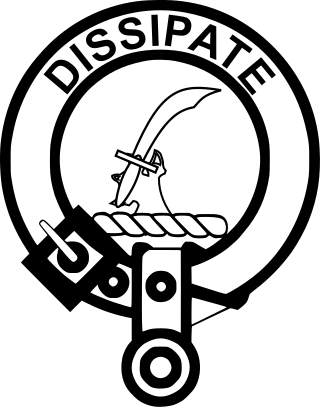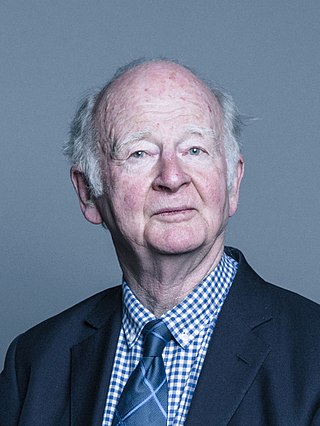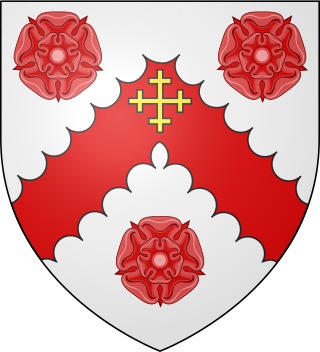Peerages in the United Kingdom form a legal system comprising both hereditary and lifetime titles, composed of various ranks, and within the framework of the Constitution of the United Kingdom form a constituent part of the legislative process and the British honours system. The British monarch is considered the fount of honour and is notionally the only person who can grant peerages, though there are many conventions about how this power is used, especially at the request of the British government. The term peerage can be used both collectively to refer to the entire body of titled nobility, and individually to refer to a specific title. British peerage title holders are termed peers of the Realm.

Michael Andrew Foster Jude Kerr, 13th Marquess of Lothian, Baron Kerr of Monteviot,, commonly known as Michael Ancram, is a British politician and peer who served as Deputy Leader of the Conservative Party from 2001 to 2005. He was formerly styled Earl of Ancram until he inherited the marquessate in 2004.

Earl of Haddington is a title in the Peerage of Scotland. It was created in 1627 for the noted Scottish lawyer and judge Thomas Hamilton, 1st Earl of Melrose. He was Lord President of the Court of Session from 1616 to 1625. Hamilton had already been created Lord Binning in 1613 and Lord Binning and Byres, in the County of Haddington, and Earl of Melrose, in the County of Roxburgh, in 1619. These titles were also in the Peerage of Scotland. The title of the earldom derived from the fact that he was in possession of much of the lands of the former Melrose Abbey. However, Hamilton was unhappy with this title and wished to replace it with "Haddington". In 1627 he relinquished the earldom of Melrose and was instead created Earl of Haddington, with the precedence of 1619 and with limitation to his heirs male bearing the surname of Hamilton. This derived from the fact that he considered it a greater honour to take his title from a county rather than from an abbey. Hamilton was a member of the prominent Scottish family of that name and descended from John de Hamilton, younger son of Walter de Hamilton, who was granted the feudal barony of Cadzow and who is also the ancestor of the Dukes of Hamilton and Dukes of Abercorn.

Earl of Dundee is a title in the Peerage of Scotland. It was created in 1660 for John Scrymgeour, 3rd Viscount Dudhope. At his death in 1668, the Duke of Lauderdale declared that the first Earl had no heirs-male, and had the crown seize all of his lands. The earldom of Dundee became dormant and its holdings and offices were granted to Charles Maitland, 3rd Earl of Lauderdale, the Duke's younger brother. The title was revived in 1953, when it was determined that the first Earl did indeed have heirs-male, contrary to the assertion of the crown. The title was given to Henry James Scrymgeour-Wedderburn, who had previously served in the House of Commons and in the Cabinet.

Earl of Rosslyn is a title in the Peerage of the United Kingdom. It was created in 1801 for Alexander Wedderburn, 1st Baron Loughborough, Lord Chancellor from 1793 to 1801, with special remainder to his nephew Sir James St Clair-Erskine, as Wedderburn had no surviving issue of his own. Wedderburn had already been created Baron Loughborough, of Loughborough in the County of Leicester, in the Peerage of Great Britain in 1780, with normal remainder to the heirs male of his body, and Baron Loughborough, of Loughborough in the County of Surrey, in the Peerage of Great Britain in 1795, with the same remainder as the earldom. The 1780 barony became extinct upon his death, but the 1795 barony and the earldom passed, by the special remainder, to his nephew, who thus became the second Earl of Rosslyn. The second Earl was a Lieutenant-General in the Army and also held political office as Lord Privy Seal and Lord President of the Council.

Earl Cathcart is a title in the Peerage of the United Kingdom.

Arthur Charles Valerian Wellesley, 9th Duke of Wellington, 9th Prince of Waterloo, 10th Duke of Ciudad Rodrigo, 9th Duke of Victoria, 9th Marquis of Torres Vedras GE, OBE, DL, styled Earl of Mornington between 1945 and 1972 and Marquess of Douro between 1972 and 2014, is a British peer and politician. He served as Conservative Member of the European Parliament for Surrey (1979–1984) and Surrey West (1984–1989) and sits as a hereditary peer in the House of Lords.

The Bearer of the Royal Banner is one of the Great Officers of the Royal Household in Scotland. The bearer participates in royal, state, and other ceremonial events when needed.

Merlin Sereld Victor Gilbert Hay, 24th Earl of Erroll, is a crossbench member of the House of Lords, chief of the Scottish clan Hay, and hereditary Lord High Constable of Scotland.

Robert Alexander Lindsay, 29th Earl of Crawford, 12th Earl of Balcarres, Baron Balniel,, known by courtesy as Lord Balniel between 1940 and 1975, was a Scottish hereditary peer and Conservative politician who was a member of Parliament from 1955 to 1974. Lord Crawford and Balcarres was chief of Clan Lindsay and also acted, from 1975 to 2019, as Premier Earl of Scotland.
Peter St Clair-Erskine, 7th Earl of Rosslyn,, known professionally as Peter Loughborough, is a Scottish peer and police officer. He is Lord Steward of the Royal Household and Personal Secretary to Their Majesties, as well as a former Metropolitan Police Commander. The Earl's lands include Rosslyn Chapel.

Henry James Scrymgeour-Wedderburn, 11th Earl of Dundee, was a Scottish nobleman, soldier and politician.

David Alexander Cospatrick Douglas-Home, 15th Earl of Home, was a British banker and hereditary peer. He was a Conservative member of the House of Lords from 1996 until his death in 2022.

Clan Scrymgeour is a Highland Scottish clan.

Patrick Robin Archibald Boyle, 10th Earl of Glasgow,, is a Scottish peer, politician and the current chief of Clan Boyle. The family seat is Kelburn Castle in Ayrshire. He currently sits as a Liberal Democrat peer in the House of Lords.

Luke Richard White, 6th Baron Annaly, is a British hereditary peer and former Government Whip in the House of Lords, who sat on the Conservative benches.

William Legge, 10th Earl of Dartmouth, styled Viscount Lewisham from 1962 to 1997, is a British politician and hereditary peer, usually known as William Dartmouth.
John Scrymgeour, 3rd Viscount Dudhope and 1st Earl of Dundee (d. 1668) was a member of the Scottish nobility and fought in the Wars of the Three Kingdoms.
Patricia Katherine Scrymgeour-Wedderburn, Countess of Dundee was the Countess of Dundee and the daughter of Lord Herbert Montagu Douglas Scott who was son of William Montagu Douglas Scott, 6th Duke of Buccleuch.














